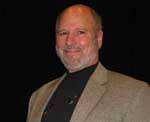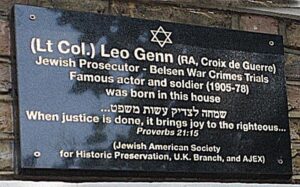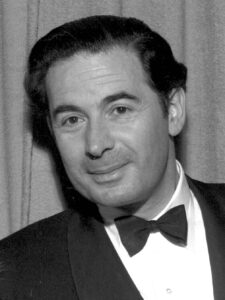
By Jerry Klinger
“The web of our life is of a mingled yarn, good and ill together.”
— All’s Well That Ends Well, Act 4, Scene 3
A few weeks ago, the Jewish American Society for Historic Preservation’s U.K. branch placed a historical marker at Leopold John Genn’s birthplace.
The marker text:

Jewish Prosecutor – Belsen War Crimes Trials
Famous actor and soldier (1905-78)
was born in this house
…שמחה לצדיק עשות משפט
When justice is done, it brings joy to the righteous…
Proverbs 21:15
It was JASHP UK’s 21st marker reflecting upon the British Jewish experience.
The black granite, polished markers are simple. They are accentuated by a Star of David. The markers help fight the rising tide of British antisemitism visibly affirming British Jewish historical presence, legitimacy, and contributions.
It was a surprise when we shared the Genn effort with the local press, none were interested. A wag sarcastically commented, “Perhaps JASHP UK has done too many Jewish markers and they are tired.”
Perhaps.
Behind every marker, there is a story.
Genn was a prosecutor at the British Belsen War Crimes Trials. It is what attracted me to his story. My mother survived Belsen because of the British.
The Bergen-Belsen Concentration Camp was liberated by British soldiers April 15, 1945. The horror they found, the sight and stench of tens of thousands of mostly Jewish corpses lying on the ground, emaciated, typhus- infected surviving prisoners, and the barely living, was incomprehensible, gut wrenching to the battle-hardened veterans.

British moral indignation boiled while they struggled to save the survivors. Thirty-five days later, the British scraped together an investigative/ prosecutorial team to bring the Nazi murders responsible to justice. Lt. Col. Leo Genn, an artillery officer, was placed in command. Genn had a short experience as a barrister before the war. However, he found his preferred calling as an actor, successfully appearing in films and on the stage. He was known for his “Cool English Composure and Black Velvet Voice.”
The War Office repeatedly pulled him away from his Command to perform in British propaganda. In early 1945, Genn was resentfully pulled away from a serious assignment as the British representative investigating Nazi War crimes against Allied military personnel in France.
May 20, 1945, Genn arrived at Belsen. He saw the immensity of the assignment, and the impossible demands on his drastically understaffed team. His farcical orders were to prepare 500 Belsen War Crime cases for Trial by early September.
Genn requested staff support, 20 times larger than what he was provided. He was turned down.
The British were stretched beyond thin.
High Command expected Genn to identify perpetrators, interview victims, and assemble documented legal briefs of monstrously complicated and barely fathomed crimes at the rate of three per day. High Command planned to have the first Allied War Crimes trial begin in September. The British wanted to be ahead of the slower-moving Americans in Nuremberg.
Without saying so, by denying Genn proper staffing and demanding the prosecution cases be ready in such a short time, High Command was guaranteeing many lesser Belsen Nazi Criminals would escape full justice.
At Belsen and Nuremberg later, judicial review and proper criminal investigation and trial, which should have taken years, had to be completed in months. Many Nazis escaped or received relatively mild jail sentences as a consequence.
Considering the thousands who ran the Nazi murder machines, only a small number faced the hangman’s noose. Most of those who were convicted and imprisoned were released after a few years, as the fickle political winds blew from a different direction. By the early 50s, Germany was needed by the West to be an ally against the Russians.
The Russian War Crime Trials did not follow the Western model where an accused was innocent until proven guilty. The Russians were more efficient with their Nazi Death Camp prisoners. Their system required the accused to prove their innocence. Confessions were far more plentiful at Russian Trials. The Russians had little problem with confessions encouraged by torture.
Genn wrote acidly in his unfinished biography years later about his Belsen experience.
“The dictates of publicity were paramount, and concentration camps must have priority over offenses against our own service personnel…in the hearts of all of us who had any operations experience whatever, this particular fact remained one for exasperation and lasting regret.”
The psychological distress imposed on Genn and his staff were near breaking. To manage the emotional strain, Black Humored Crime Dinners were enjoyed. A theatrical company that Genn knew was touring nearby. Genn arranged for them to come and perform at Belsen. Genn even took time, inappropriately, to pen a short play of his own.
No sooner than his skeleton staff was trained, members were scavenged by High Command for other units or even demobilized. Genn and his shrinking staff plowed on until August, when he too was reassigned to different War Crimes duties.
Genn was burned out. He did not work out at his new assignment and was quickly recommended to be moved. October 1945, Genn was demobilized. He returned to London and resumed, with ever greater success, his acting career.
The Belsen War Crime trials lasted from September 17 to November 17, 1945. Eleven Nazis were sentenced to death and hung. Eighteen were sentenced to prison and fifteen Nazis were found not guilty.
Of the estimated 400-500 Nazis who ran Belsen, the vast majority escaped any justice. The Americans experienced similar results.
All the War Crime Trials, American, British, French, Polish and Russians, for the most part, did not focus on the Holocaust or the extermination of World Jewry. The world was exhausted with War and Crimes.
Until the State of Israel located, kidnapped, and brought to Israel for trial Adolph Eichmann, the puppet master of the Holocaust, in 1960, there never was a War Crimes Trial for Crimes against the Jews and their 6 million-plus victims. Israel hanged Eichmann; his cremated ashes dumped far out at sea.
The Holocaust remained a largely unspoken story until the 1978 American T.V. miniseries The Holocaust was aired. An estimated 120 million Americans saw it and were horrified. A year later, it was shown in Germany to 20 million. The Germans promptly removed their Statutes of Limitations for War Crimes.
The cycle of awareness of the Holocaust ebbs and flows but is mostly ebbing today. In the U.K., where Holocaust awareness is educationally mandated, less than 50% have ever heard of Auschwitz. The United States, most of the world and even Israel, is no better. In the Muslim world, the Holocaust is virtually unknown. If it is, it is energetically denied.
Perhaps the Jewish and local media were not aware of the background story of the Genn marker. Perhaps it was just another marker to them. Perhaps they were aware and did not care.
Not caring is to the detriment again to Jews, 7th Day Adventists, Quakers, LGBT individuals, etc., or perhaps somebody else in the world the hater will choose who said something they did not like or is simply, different.
*
Jerry Klinger is President of the Jewish American Society for Historic Preservation, www.JASHP.org